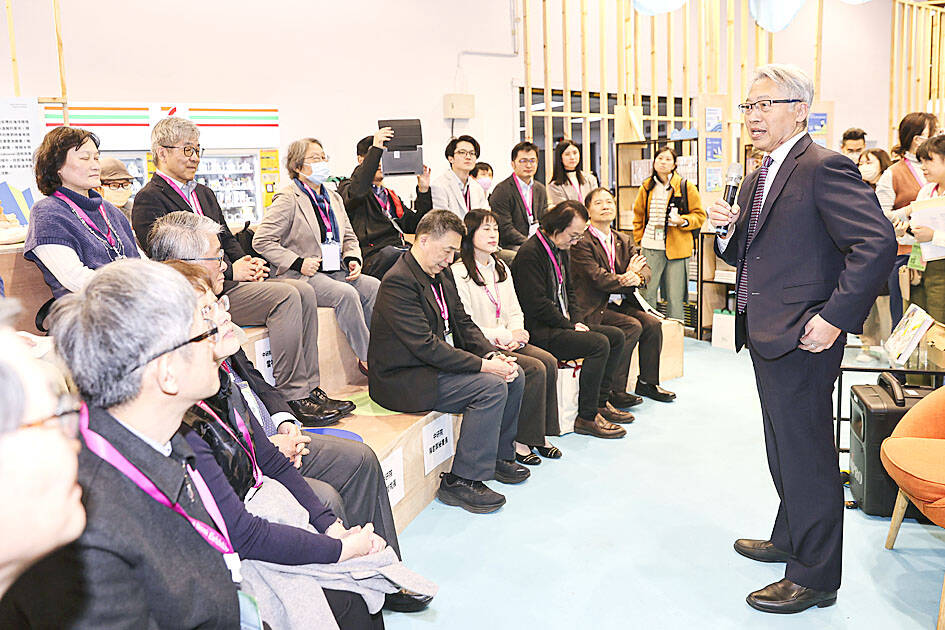Taiwan’s international reputation would be harmed by cutting a large portion of Academia Sinica’s budget at a time when national defense, economics, politics, and science and technology are closely linked, Academia Sinica president James Liao (廖俊智) said yesterday.
The Legislative Yuan, led by the Chinese Nationalist Party (KMT) and the Taiwan People’s Party, froze 30 percent of the institute’s operational expenses, or NT$1.2 billion (US$36.38 million).
It also cut 15 percent of its funding for travel expenses, 60 percent for media and publicity expenses, and about NT$100 million for equipment.

Photo: CNA
Making major cuts to Taiwan’s leading research institution gives the impression that the nation does not prioritize scientific advancement, Liao said at the opening of Academia Sinica’s booth at the Taipei International Book Exhibition.
“At a time when science is more crucial than ever for economic, political and defense development, failing to increase investment would raise questions globally,” he said.
Many other research and academic institutions are facing a similar situation, which has heavily affected morale, Liao said.
Taiwan already lags behind other countries in terms of its treatment of scientists and now its dedicated researchers face budget cuts and scrutiny, as well as a lack of recognition, he said.
Many researchers have reached out privately with concerns and complaints, and many worry about potential job cuts, he said.
This kind of environment might cause researchers to move abroad or join the private sector, he said.
When funding sources are unstable, contract workers such as research assistants are less likely to accept jobs due to concern about their salaries, Liao said.
This would stall and halt many research projects, he said.
Cutting travel expenses will affect researchers’ participation at international conferences and exchanges with other leading scientists, he added.
While online meetings are becoming more efficient, many research collaborations still require in-person interactions to conduct experiments, fieldwork and build long-term partnerships, he said.
In related news, the Central Taiwan Joint Services Center has halted most of its operations due to budget cuts, center Director Chuang Ching-cheng (莊競程) said.
The legislature cut the center’s budget by 99 percent, from almost NT$7 million to just NT$70,000.
All operations face serious disruptions and delays, Chuang said.
The center, which helps communicate government policies and coordinate among agencies, might be unable to pay the salaries of five contract workers and cleaning staff, who would be forced to resign, he said.
The center’s crisis response services have also been halted, he said, adding that the disruptions might also affect the Ministry of Foreign Affairs’ Central Taiwan Office, which rents the center’s eighth floor for passport production, potentially affecting passport applications for residents of central Taiwan.
As the budget was cut rather than frozen, the only option is to wait and see if it is reinstated, he added.
Additional reporting by CNA

“China is preparing to invade Taiwan,” Deputy Minister of Foreign Affairs Francois Wu (吳志中) said in an exclusive interview with British media channel Sky News for a special report titled, “Is Taiwan ready for a Chinese invasion?” the Ministry of Foreign Affairs said today in a statement. The 25-minute-long special report by Helen Ann-Smith released yesterday saw Sky News travel to Penghu, Taoyuan and Taipei to discuss the possibility of a Chinese invasion and how Taiwan is preparing for an attack. The film observed emergency response drills, interviewed baseball fans at the Taipei Dome on their views of US President

ECONOMIC BENEFITS: The imports from Belize would replace those from Honduras, whose shrimp exports have dropped 67 percent since cutting ties in 2023 Maintaining ties with Taiwan has economic benefits, Ministry of Foreign Affairs officials said yesterday, citing the approval of frozen whiteleg shrimp imports from Belize by the Food and Drug Administration (FDA) as an example. The FDA on Wednesday approved the tariff-free imports from Belize after the whiteleg shrimp passed the Systematic Inspection of Imported Food, which would continue to boost mutual trade, the ministry said. Taiwan’s annual consumption of whiteleg shrimps stands at 30,000 tonnes, far exceeding domestic production, the ministry said. Taiwan used to fill the gap by importing shrimps from Honduras, but purchases slumped after Tegucigalpa severed diplomatic ties with Taiwan

The Executive Yuan yesterday approved a southwestern extension of the Sanying MRT Line from New Taipei to Bade District (八德) in Taoyuan, with a goal of starting construction by late 2026. The 4.03-kilometer extension, featuring three new stations, will run from the current terminus at Yingtao Fude Station (LB12) in New Taipei City to Dannan Station (LB14), where it will connect with Taoyuan’s Green Line, New Taipei City Metro Corp said in a statement. This extension will follow the completion of core Sanying Line, a 14.29-kilometer medium-capacity system linking Tucheng (土城), Sansia (三峽)

CARGO LOSS: About 50 containers at the stern of the ‘Ever Lunar’ cargo ship went overboard, prompting the temporary closure of the port and disrupting operations Evergreen Marine Corp, Taiwan’s largest container shipper, yesterday said that all crew members aboard the Ever Lunar (長月) were safe after dozens of containers fell overboard off the coast of Peru the previous day. The incident occurred at 9:40am on Friday as the Ever Lunar was anchored and waiting to enter the Port of Callao when it suddenly experienced severe rolling, Evergreen said in a statement. The rolling, which caused the containers to fall, might have been caused by factors including a tsunami triggered by an earthquake in Russia, poor winter sea conditions in South America or a sudden influx of waves,